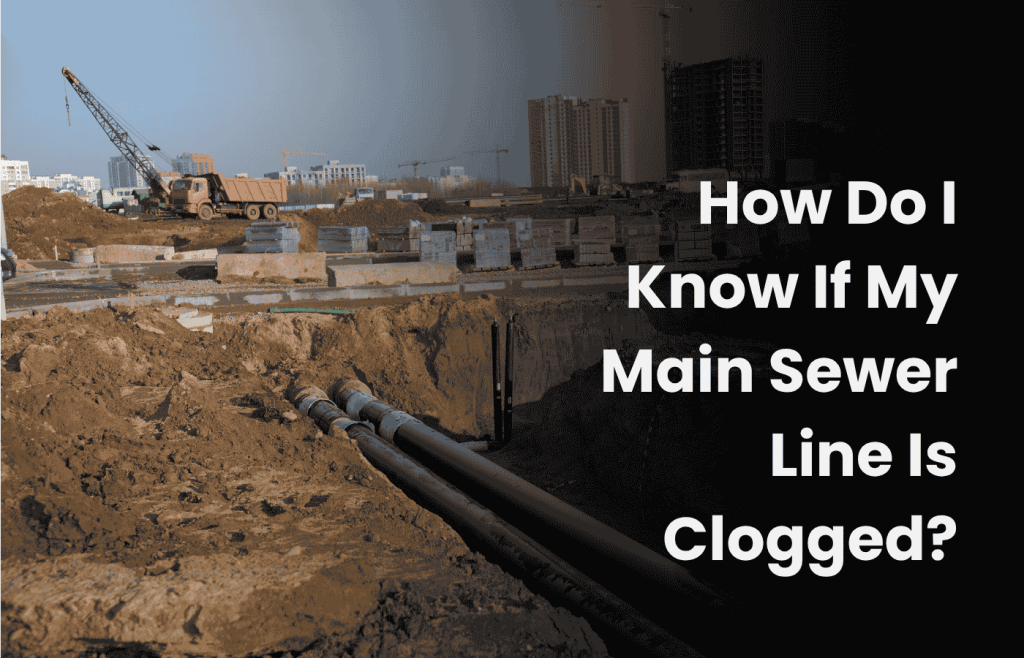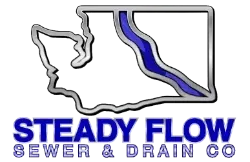How Do I Know If My Main Sewer Line Is Clogged?
“How do I know if my main sewer line is clogged” is one of the most common questions Washington homeowners ask when drains start acting up. A clogged sewer line can cause slow drains, backed-up toilets, or sewage water in your basement. For any plumbing emergency, early detection helps prevent serious sewer issues and costly sewer repair. In this detailed guide, Steady Flow Sewer & Drain explains how to identify signs of a main sewer clog, what causes it, and when you need professional service to protect your home. Your home’s main sewer line connects all indoor drains, fixtures, and plumbing systems to the city’s public sewer. It’s responsible for removing wastewater from sinks, toilets, showers, and your washing machine. When this main drain becomes blocked, it affects every plumbing fixture in your home. Washington’s wet soil and heavy rainfall can shift underground pipes, while nearby tree roots may invade the line seeking moisture. These roots often grow through pipe joints, causing cracks and clogged sewer drains that disrupt normal water flow. Unlike a single sink clog, a main sewer clog affects all household drains. Water can back up through toilets or floor drains, leading to property damage and unpleasant sewage odors. Quick action and professional plumbing service can save your system from long-term harm. Knowing the early signs of sewer issues helps avoid bigger plumbing problems later. If you’re wondering “how do I know if my main sewer line is clogged,” start by looking for these common red flags. If more than one drain is running slow or backing up, it’s a strong indicator of a clogged sewer line. The blockage prevents wastewater from flowing freely, pushing it back into your sinks, bathtubs, or toilets. Strange gurgling sounds suggest trapped air inside the sewer line. It’s a typical symptom of a sewer clog deep in your main drain that requires professional inspection. Persistent foul odors are one of the first signs your sewer line is clogged. Sewage gases trapped inside pipes can escape through fixtures or outdoor vents, creating unpleasant smells. If you notice dirty water bubbling out of your basement floor drain, that’s a major warning. This often happens when a main sewer clog pushes wastewater back into your home. A leaking or broken sewer line can cause overly green grass patches, soft spots, or soggy soil. This is often due to wastewater escaping underground. If plunging your toilet or using a drain cleaner doesn’t help, the problem is likely in your main sewer line, not the individual drain. If you’ve been asking yourself “how do I know if my main sewer line is clogged,” it’s also important to understand why it happens. Tree roots are among the top causes of sewer blockages in Washington. They infiltrate old clay or cast-iron pipes, wrapping around and breaking the main line. Over time, this root growth causes serious sewer issues and requires expert sewer repair. Cooking grease, oil, and soap residue can cling to the walls of your sewer drain, slowly reducing the line’s diameter and restricting water flow. Aging pipes can corrode or collapse, especially in older Washington homes. When a section of the main sewer fails, it creates an obstruction that traps waste and water. Paper towels, hygiene products, and wipes don’t break down easily and can cause a complete main sewer blockage. Always dispose of them properly to protect your plumbing. Heavy rain can saturate the soil and increase pressure on buried pipes, while freezing weather can cause them to crack or shift, both leading to clogged sewer issues. Most plumbing services in Washington charge a diagnostic fee for camera inspection or locating the main sewer clog. Clearing: Hydro-jetting or snaking the drain costs about $200 to $500. Repairing: Fixing small damaged sections can range between $800 to $3,000. Replacing: A full sewer line replacement can cost $4,000 to $12,000, depending on the situation. The price depends on pipe type, soil conditions, root intrusion, and how easily the plumbing technician can reach the clogged section. Across cities like Tacoma, Bellevue, and Everett, homeowners spend between $250 and $900 for drain clearing, while large-scale sewer repair may reach $10,000 or more. If you’re unsure “how do I know if my main sewer line is clogged,” there are simple steps you can take before calling a plumber. Stop using water and shut off fixtures connected to the main drain. Locate your sewer clean-out access. Avoid flushing toilets or running washing machines. Call a licensed plumber to inspect and clear the line. Open the clean-out cap carefully to see if water is standing or moving slowly. If you spot buildup or sewage, avoid using chemical drain cleaners, they can damage pipes. If multiple drains are affected or water backs up repeatedly, contact a professional main sewer line service in Washington for thorough inspection and repair. Our plumbing experts understand the unique conditions that affect Washington homes, from rain-soaked soil to aging sewer lines. We use state-of-the-art sewer cameras and hydro-jetting machines to clear stubborn blockages and identify cracks or root infiltration. We provide upfront quotes, same-day service, and ongoing maintenance plans to prevent future clogged sewer problems. Schedule regular camera inspections of your main drain to spot potential problems early and avoid costly sewer repair later. Don’t flush wipes or pour grease into drains. Even small amounts can accumulate and cause sewer clogging over time. When planting trees, keep them at least 10 feet from your main sewer line to prevent tree root damage. After significant weather events, check for water pooling or slow drains, both can signal a developing main sewer issue. At Steady Flow Sewer & Drain, we proudly serve communities across Tacoma, Bellevue, Kirkland, Redmond, Everett, and the greater Puget Sound region. Whether your home faces a minor drain clog or a major sewer line blockage, our plumbing team ensures your system flows smoothly. Why Choose Us: Licensed and insured Washington plumbing professionals 24/7 service for clogged sewer and drain emergencies Fast response across Puget Sound Our Services: Contact Information: Usually, it’s a capped pipe near the home’s foundation or close to your main water line. No, chemical solutions can corrode your sewer line and cause long-term damage. Most services take 1 to 2 hours, depending on how deep or severe the clog is. Some policies include coverage for sudden pipe collapse or sewer backup; check with your insurer for details. At least every 1 to 2 years, especially if your plumbing system or main drain is more than two decades old.
How Do I Know If My Main Sewer Line Is Clogged? Signs & Solutions in Washington
What Is the Main Sewer Line and Why It Matters in Washington
Definition and Function of the Main Sewer Line
How Local Soils, Tree Roots & Climate Impact Sewer Lines in Washington
Why a Clogged Main Sewer Line Is More Serious Than a Single Fixture Clog
What Are the Signs of a Clogged Main Sewer Line in Your Home?
Multiple Drains Backing Up Simultaneously
Gurgling or Bubbling Sounds from Toilets, Sinks, or Floor Drains
Foul Sewage Smell Indoors or in the Yard
Standing Water or Sewage Backing Up from Clean-Out or Floor Drain
Yard Anomalies: Lush Grass, Sinkholes, or Damp Patches Above the Sewer Line
Slow Draining in More Than One Appliance or Fixture
What Causes Main Sewer Line Clogs?
Tree-Root Intrusion into Underground Lines
Grease, Fat, Oil, and Solids Accumulating Over Time
Pipe Damage, Corrosion, or Collapsed Sections
Flushing Inappropriate Items
Seasonal or Weather-Related Impacts (Washington Rain, Ground Shifting)
How Much Does It Cost to Fix a Clogged Main Sewer Line in Washington?
Typical Service Call & Diagnostic Fees
Clearing vs. Repairing vs. Replacing the Line
Cost Factors: Pipe Material, Depth, Access, Tree Roots, Yard Restoration
Example Local Cost Range for Washington Homeowners
What Should You Do If You Suspect Your Main Sewer Line Is Clogged?
Immediate Steps to Take
DIY Checks You Can Safely Attempt
When to Call a Professional
Why Choose Steady Flow Sewer & Drain for Main Sewer Line Problems?
Our Local Expertise in Washington Plumbing and Sewer Systems
Advanced Inspection Technology (Camera Scopes, Hydro-Jetting) We Use
Transparent Pricing, Fast Service, and Preventive Maintenance Plans
How to Prevent Future Main Sewer Line Clogs
Routine Inspections and Clean-Outs
Proper Disposal Habits
Landscaping Tips: Tree Placement Away from Sewer Path
Maintenance Checks After Heavy Rain or Ground Shifts
Serving Washington and Surrounding Cities
Contact Steady Flow Sewer & Drain
We specialize in sewer line inspection, drain cleaning, tree root removal, and hydro-jetting to clear stubborn clogs safely.
Call Steady Flow Sewer & Drain today for reliable sewer repair, maintenance, and inspection services anywhere in Washington, including Tacoma, Bellevue, Redmond, Everett, and nearby areas. If you’re still wondering how do I know if my main sewer line is clogged, our team is ready to help you find the answer fast and keep your plumbing system healthy.Frequently Asked Questions (FAQ)
How Do I Locate the Sewer Clean-Out on My Property?
Can I Use Chemical Drain Cleaners for a Main Line Clog?
How Long Does Clearing a Main Sewer Line Typically Take?
Will My Homeowner’s Insurance Cover Sewer Line Repairs?
How Often Should I Schedule a Camera Inspection of My Sewer Line?
Read our reviews
Special Offers

Contact Our Team for an Appointment
Our trenchless company prioritizes your satisfaction with our work. We strive to be your trusted provider of all drain and sewer line services, and we look forward to serving you. For more information about trenchless pipe lining or to arrange an appointment, call us at Steady Flow Sewer & Drain or fill out the online form today.
